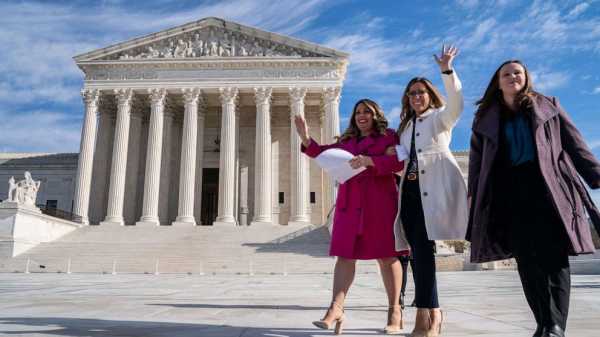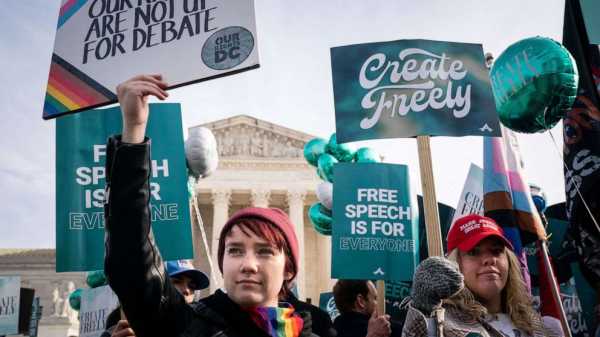LGBTQ+ advocates, and the dissenting Supreme Court judges, fear the recent Supreme Court ruling on free speech has opened the door to encourage discrimination.
The Supreme Court ruled on Friday in favor of an evangelical Christian website designer in a case involving whether businesses can refuse to do services that involve expressive speech because of First Amendment free speech rights.
The Court holds that the website designer cannot be forced by Colorado law to create expressive messages with which the designer disagrees.
In this case, the designs would be for a wedding website for an LGBTQ+ wedding, which the designer may be opposed to.
The ruling comes on the last day of Pride month, which celebrates the LGBTQ+ community.

Lorie Smith, a Christian graphic artist and website designer in Colorado, in pink, prepares to speak to supporters outside the Supreme Court on Monday, Dec. 5, 2022 in Washington, DC.Kent Nishimura/Los Angeles Times via Getty Images, FILE
It also comes amid an increasingly hostile political climate against this demographic, which has seen a rise in violence and threats.
“This decision by the Supreme Court is a dangerous step backward, giving some businesses the power to discriminate against people simply because of who we are," said Kelley Robinson, the president of the Human Rights Campaign.
She continued, "This decision continues to affirm how radical and out-of-touch this Court is, especially when 80 percent of Americans support robust and LGBTQ+ inclusive nondiscrimination laws."
"Colorado seeks to force an individual to speak in ways that align with its views but defy her conscience about a matter of major significance," the opinion by Justice Neil Gorsuch reads.
MORE: Supreme Court affirmative action decision could impact racial equity in higher ed
In her dissent, Justice Sonia Sotomayor said this is the first time in history the court has granted a business open to the public a right to refuse service to members of a protected class.
"The law in question targets conduct, not speech, for regulation, and the act of discrimination has never constituted protected expression under the First Amendment," said Sotomayor. "Our Constitution contains no right to refuse service to a disfavored group."
Sotomayor warned the decision could lead to discrimination against other marginalized groups as well on the basis of free speech: "A website designer could equally refuse to create a wedding website for an interracial couple, for example," the dissent read.

Members of both sides of the debate stand in front of the Supreme Court of the United States on Monday, Dec. 5, 2022 in Washington, DC. The High Court heard oral arguments in a case involving a suit filed by Lorie Smith, owner of 303 Creative, a website design company in Colorado who refused to create websites for same-sex weddings despite a state anti-discrimination law.Kent Nishimura/Los Angeles Times via Getty Images, FILE
Dr. David J. Johns, executive director of the Black LGBTQ+ civil rights organization National Black Justice Coalition, criticized the far-reaching implications of the decision.
“The decision threatens the progress towards achieving full equality, creates a climate of uncertainty and fear for LGBTQ+ individuals who already face significant discrimination and violence when simply trying to live their lives, and, as a result, weakens democracy," Johns said in a statement.
Nearly 500 bills targeting the LGBTQ+ community have been introduced in state legislatures across the country this year, according to the ACLU.
“This decision will bring harm and stigma to LGBTQ families and is yet another example of a Court that is out of touch with the supermajority of Americans who believe in fundamental freedoms and know that discrimination is wrong," GLAAD President Sarah Kate Ellis said in a statement. "Businesses that are open to the public should serve all in the public.”
Sourse: abcnews.go.com






